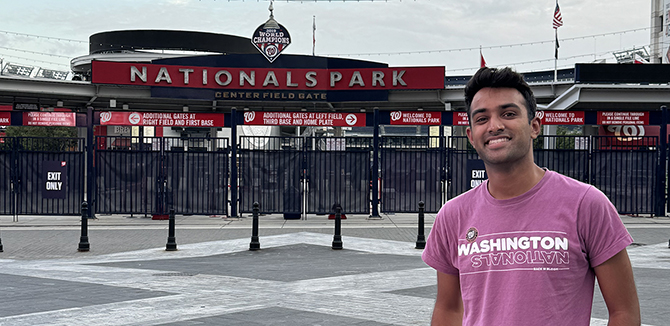Putting the Fans First
Ilesh Jain spent the summer applying lessons learned in Northwestern's MBA + MS Design Innovation (MMM) program to help the Washington Nationals business strategy and analytics team.

In 2021, Ilesh Jain (MMM '25) witnessed the excitement that comes when a Major League Baseball team wins the World Series. He was a consultant at Boston Consulting Group in Atlanta when the Atlanta Braves beat the Houston Astros to be crowned the sport's top team.
The passion around the city for the team was infectious. As Jain relished the team's success, he realized how stimulating it could be to work in the sports industry.
This past summer, Jain experienced the industry for himself.
Jain spent the summer as an intern with the business strategy and analytics team for the Washington Nationals. In that role, he and his team members provided data analytics models and strategic recommendations across the organization, including pricing, marketing, sales, ballpark operations, and non-baseball-related events at Nationals Park.
His primary focus was to create a needs-based segmentation strategy to categorize fans based on their motivations for attending games.
To succeed, Jain relied on lessons learned in Northwestern's MBA + MS Design Innovation (MMM) program — a dual-degree program between Northwestern Engineering and the Kellogg School of Management.
"When I think about my core project, MMM definitely influenced the way that I was thinking," he said. "The project required both qualitative and quantitative research to identify patterns across different types of fans, turn those into insights, and shape strategies. It was very much a design-thinking approach, which MMM really helped me develop."
Jain's interest in sports dates back years, but he was not a big baseball fan before working with the Nationals. He grew up in Columbus, Ohio, where football and hockey were his favorite sports. As he considered potential internship opportunities, he felt he'd learn the most by working in a sport that was in-season.
Looking back on his experience, Jain said he made the right choice.
"My long-term career goal is to work in the business and fan experience side of a team or league," he said. "Working for the Nationals allowed me to explore what a career in sports could truly look like. Since baseball is in-season during the summer and DC is a major sports city, I got a deep dive into the real-time challenges teams need to solve, which made it an exciting learning environment."
Jain initially felt some imposter syndrome because he never worked in the sports industry before. He was, however, able to rely on one previous sports experience he had thanks to MMM.
Jain teamed with Tabassum Qurashi (MMM '25) and Brandon Chubb (Kellogg '24) to take first place at the First Pitch Case Competition at the 2024 Sloan Sports Analytics Conference. The team partnered with NASCAR for the competition to analyze and find opportunities within its ticket strategy to offer targeted sales and marketing tactics that connect with a wide range of autosport fans.
The project closely resembled what Jain would do with the Nationals.
"Earning first place at Sloan gave me the confidence that I could thrive in the sports business world," Jain said. "More broadly, the conference buzzword in every talk was 'personalization' — a concept spanning sports, leagues, and organizations. That shaped my focus during the internship on creating fan experiences that feel individually tailored."
Now back at Kellogg, Jain is tailoring his second year in MMM to continue building his sports experience. Earlier this quarter he and Samir Ramakrishnan (MMM '25) launched Front Office Audible, a sports business podcast. Early episodes of the bi-weekly podcast featured interviews with guests about the business side of sports, the explosive growth of the WNBA, and the evolving world of name, image, and likeness (NIL) laws in college athletics.
Jain still can't fully believe a Major League Baseball stadium was his office last summer. When he started the internship, he worried he'd be out of place. Now he is confident sports is where he belongs.
"Even though there was a learning curve, I found that my past academic and professional experiences translated more than I expected, especially with new challenges like building economic impact models," he said. "Sometimes I had to step back and have a 'pinch me' moment. It’s easy to get caught up in the daily grind, but taking a moment to appreciate the experience was important."
